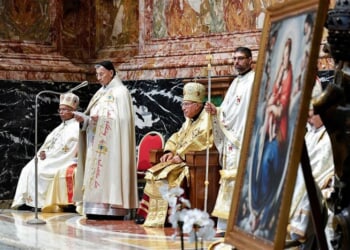Lord Ashcroft KCMG PC is an international businessman, philanthropist, author and pollster. For more information on his work, visit lordashcroft.com
This month’s focus groups took us to Portsmouth, to hear from 2019 Conservatives who switched to Reform; Southampton, to hear from switchers to Labour; and St. Ives, to hear from switchers to the Liberal Democrats.
The Angela Rayner property saga was the first political event to be mentioned by most of the groups. There was some sympathy for her over the complexities of house buying and the reliance on legal advice, most agreed that she had to go (though some thought there had been a degree of poetic justice: “The darling of the left, Angela Rayner, and her third property. Tell us again about the rich, Angela?” “It’s so hypocritical because she’s the biggest one who’s called these things out, then she just does it herself”).
At the same time, some thought her departure would be a loss to front-line politics: “She probably had to go but I do think it’s sad because in a world where people look at politics as being beige and a particular type of gentleman, she was very much Technicolor. Her story of where she came from was more interesting to me than what she stood for. She just seemed to be cut from a different cloth as a politician.”
“We want our country back. We want a bit of civilisation and a bit of control”
Most had also seen the proliferation of flags on lampposts and roundabouts, including many in their own neighbourhoods. They usually saw them in a positive light, and often as a protest at the failure to deal with illegal migration or a wider assertion of national identity which many felt was being eroded or attacked: “It’s saying this is Britain and we want our country back. We want a bit of civilisation and a bit of control;” “I think it started from the Bell Hotel. It’s like, we’re British, and you can’t keep putting people in these places and have the taxpayer paying for it when the country is going down the pan;” “It’s dissatisfaction with the government. They’re doing the exact opposite of the will of the people. We’ve voted against large amounts of immigration at every election, and every government has run on it, but it increases and increases;” “I don’t see it as a far-right thing. I see it as a ‘you’re not alone in wanting a bit of your country back and a sense of identity’ thing.”
Several commented on what seemed to be an increasingly familiar double standard in the response from local authorities: “They say it’s dangerous but – nothing against Pride, but when they put the rainbows on the zebra crossings, is that not dangerous? It’s two-tier, isn’t it?” “It’s interesting that the councils have got money to go out the next day and paint over these roundabouts, but they can’t fix a pothole.”
Some of these recent Tories were much less comfortable with the flag outbreak, seeing it as an expression of hostility to immigrants and foreigners: “It’s not patriotic to stir up hatred. They’re trying to intimidate the immigrants;” “It’s saying ‘this is our territory, and if you’re not British you don’t belong here’.”
“That was truly the moment when the Labour government told the British people what they thought of them”
It was also clear that the reaction to the flags in some quarters, as well as to the migrant hotel protests, only made people more indignant and determined: “Now suddenly we’re racist if we fly a flag. You can have a Palestinian flag though;” “When the prime minister of the country labels anyone who’s concerned about their kids’ safety and whatever’s going on as far-right fascists and thugs…;” “If you stand up and say ‘we’ve had enough of this’ you’re labelled racist, so you have to do it in another way. It’s almost anonymous, but still support for the country;” “The more you suppress people…”
The Bell Hotel case and its repercussions was still at the top of some participants’ minds (“That was truly the moment when the Labour government told the British people what they thought of them, that the rights of illegal migrants who had broken into the country trump those of taxpaying citizens. It beggars belief”.) Some sympathised with the government’s position (“where else do they go?”) but more often, people were exasperated that another solution had not been arrived at: “You could put them in ex-military bases but that’s deemed not suitable. It’s suitable for people like myself in the army that live in transit accommodation, which is absolutely disgusting, but they will complain about it. But if you’re fleeing those sorts of countries, you’d be grateful for getting three meals a day and that you’ve got a bed and you’re warm and safe.”
“I like it but we can’t do it. The lawyers and do-gooders will fight it”
Accordingly, many welcomed what they had heard of the Reform plan to deport 600,000 illegal migrants over the course of a parliament, as well as incentivising migrants to leave, creating secure accommodation and barring illegal entrants from claiming asylum. Some objected on practical grounds or because they didn’t trust Nigel Farage or his party (“People are just going to come over and get the money and go back home again;” “People will come over and they will just vanish;” “It sounds like that big banner that he had saying if we leave Brexit we’re going to get this much for the NHS. It’s that all over again”).
At least as often, however, participants said they liked the ideas but that even an elected Reform government would somehow be blocked from implementing them: “I like it but we can’t do it. There will be lawyers and do-gooders or whatever you want to call them that will fight it;” “It’s a brilliant policy, but how long will it be before human rights lawyers get involved, or NATO or the UN or whoever, and say ‘you can’t do that, it contravenes human rights’?”
Even so, the other parties’ failure to deal with the issue combined with Reform’s apparent determination to do so led many to conclude that they were worth backing, even if they didn’t manage to achieve everything they hoped: “Farage comes across with conviction. He’s not namby-pamby. He sounds like he means it. It seems like he actually wants to do it, which makes a difference I think;” “Once there’s TikTok videos going back to Afghanistan saying there’s no point in coming because you’re not going to get in… The same happened in Australia, didn’t it? And Greece have put a complete stop to it.”
Frustration at successive governments’ failures in this and other areas, together with the impending state visit, led the groups to reflect on Donald Trump’s presidency: “I think he’s changed the atmosphere. When you see what he’s done, like criminals arrested, people who don’t belong here are out… It’s like, wow, is it that simple all the time?” “In our country everything has to go through parliament and all the rigmarole of that. Whereas Trump sat there with his folders for three or four weeks just signing it all. It would be great if Farage were to get in and do some of that stuff, but he would be blocked just like the Conservatives were.”
“It feels to me like they don’t think they’re going to be in for a very long time”
None expected the reshuffle following Rayner’s departure to make much difference (“It’s changing the deckchairs on the Titanic”). Many felt the Labour government seemed to lack sense of purpose: “They feel a bit scatty. They’ve got lots of different people coming out and saying things and they don’t seem very unified;” “It feels to me like they don’t think they’re going to be in for a very long time. They don’t give me the impression that ‘we’re going to implement this and it’s going to take this many years’. I don’t feel like they’ve got a long-term plan.”
A number of participants, including some who had switched to the Lib Dems as well as Labour, had some regard for Starmer and were still giving the government the benefit of the doubt: “I think they’re doing quite a good job. I think Keir Starmer’s quite sensible. I think 15 months isn’t long, is it, to really try and have an impact which can be felt;” “He’s less kind of in-your-face. He seems quite unflappable.”
“It’s ‘if you’ve got money, we want it’”
However, none were looking forward to the November Budget. The groups all expected tax rises (“it’s ‘if you’ve got money, we want it”), but few thought there would be anything to show for in improved public services or anything else that would benefit them: “I read yesterday that a hotel owner in Tintagel was offered £20 million to house migrants. That’s where my increased tax always seems to be going.” There was some exasperation that while debt and taxes rose, the government seemed to be making no real effort to control spending: “Something was published today that we’re at the highest amount of debt we’ve ever been in. The actual bond yields are higher than under Liz Truss;” “It’s tanking, isn’t it? The IMF are going to step in at some point;” “One thing they tried was welfare. But then 200 MPs voted against it and there was a petition, so that was it. That was the only thing they tried to do.”
Some felt that Britain’s economic problems were more fundamental and long-term, and the result of bad government over many years and, ultimately, the voters themselves: “This country is soft as hell. It expects too much for too little. It’s become decadent. We have all these vanity projects, we paint rainbows on zebra crossings and all that sort of stuff. There are the nice-to-haves, but the wastage in the military, in government departments, the way we procrastinate…;” “I think we’re in real trouble. The national debt is gigantic, we’re slowly getting poorer and poorer, and tweaking taxes every now and then isn’t really going to help in the long run. But all the things they would have to put in place would upset the voters, so those things never happen.”
“They don’t have an angle yet”
Some participants had noticed Kemi Badenoch’s policy on North Sea drilling, often with approval (“It seems to make sense to me. Why pay someone else to drill your oil out of the sea when you can drill it and get the revenue yourself?”). However, most could not remember any other recent interventions and felt the Conservatives had “lost their voice”. Most of those who had formed a view of Badenoch liked her, but several observed that the party did not seem to have united behind her: “I’ve caught her on Laura Kuenssberg, and I think, I quite like her. But I don’t feel her party’s with her;” “But that’s typical Tory, isn’t it? Someone comes to power and before you know it they’ve been stabbed in the back. Look at how many prime ministers we went through.”
Many felt that the Conservatives were struggling to position themselves in the political market: “Reform has got more traction. They’re picking their audience and really going for it whereas the Conservatives are in limbo, almost. They don’t have an angle yet. What’s their strong target audience, apart from generally helping businesses. But they haven’t shown how they’re going to help them.” However, participants also felt there was little the Tories could do to win people over until voters were ready to listen: “I think they need to take a step back and let Labour dig themselves into a hole, or let them dig a bit deeper, before they jump back in and start accusing people of things. Because all that will happen is they’ll turn round and say, ‘you handed us this’.”
Even in St. Ives, most had heard little or nothing about the Liberal Democrats since the election: “You don’t hear a lot about them. They’re sort of in the margins. They’re not rattling any cages.” Most said they had voted for the party because they liked Andrew George, or for local reasons, or because they were the most acceptable alternative to the Tories: “I think down here you vote for who you think is going to support the needs of where you are. We’re not voting for who you think is going to sit in London;” “There’s a difference between how they live their lives and how everyone else lives their lives because of them. So I’ve become very disillusioned with politicians, and that’s why I voted the way I did, because he was local.” Only one said she had been drawn to the party over a policy issue: “I care a lot about the Middle East situation and Gaza. I think the Lib Dems came out very early and very clearly, and Labour were trying to be mealy-mouthed and sat on the fence”
Finally, with a new season on the way, what would Keir Starmer be like on Strictly – or another TV talent show of his choosing? “He’d do a waltz. He seems very classic. It wouldn’t be Latin, would it? I don’t think I’d want to see him do a rumba.” Any other shows? “Traitors. He’d be the traitor;” “I think you’d be more likely to see him on Lego Masters;” “If he did I’m A Celebrity people would vote to keep him in every time because they wanted to see him go through the whole pain;” “I think he’d do Great British Bake-Off.” What would he bake? “A Victoria sponge. With a union jack on it. And a little flag.” How would he come across? “I don’t think he would send himself up that much;” “I think he’d try and be a Prince Charming type;” “He would try and be funny and relevant, but you’d think ‘what a pillock’.”
What would Nigel Farage do? “I think he’d be on Britain’s Got Talent as one of those roast comedians they have in America. He’d be good at something like that;” “I’d love to see him on The Chase. He’d give that maths teacher, The Beast, a run for his money. I think he’s very intellectual, very knowledgeable. He’s one of those guys who knows a little bit about everything.”
How about Kemi Badenoch? “She’s quite serious, is the impression I get, so if she was on Strictly I think she would work hard at it. She’d put the hours in;” “I think she’d be on something like Gladiators. She’s quite feisty, isn’t she?” And Ed Davey? “That diving one. Splash! He loves falling into the water.”





![ICE Arrests Illegal Alien Influencer During Her Livestream in Los Angeles: ‘You Bet We Did’ [WATCH]](https://www.right2024.com/wp-content/uploads/2025/08/ICE-Arrests-Illegal-Alien-Influencer-During-Her-Livestream-in-Los-350x250.jpg)
![Gavin Newsom Threatens to 'Punch These Sons of B*thces in the Mouth' [WATCH]](https://www.right2024.com/wp-content/uploads/2025/08/Gavin-Newsom-Threatens-to-Punch-These-Sons-of-Bthces-in-350x250.jpg)








